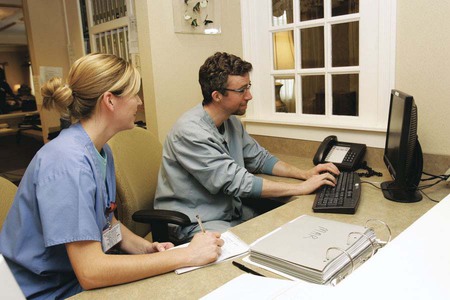Chapter 4 Ethical and legal responsibilities are a central part of all health care occupations. The worker must understand and follow ethical practices, including respect for cultural, social, and ethnic differences of the patients and other workers. Legal responsibilities include practicing within the guidelines of laws, policies, and regulations established for each type of employment (Box 4-1). Health care workers must stay within a “scope of practice” or use the methods and procedures in which they are trained (Table 4-1). The Nurse Practice Acts (NPAs) are state laws that determine which tasks nurses may legally perform. Some common laws or traditional practices also influence nursing practice. Performing skills or tasks that are outside the health care worker’s scope of practice is illegal as well as unethical. The health care worker who is supervising others may delegate some tasks. For example, the registered nurse or licensed physician may ask a licensed practical nurse to assess the patient’s health by collecting, reporting, and charting data. The licensed practical nurse does not work independently. The nurse assistant works under the supervision of the registered nurse or licensed practical nurse (Fig. 4-1). The medical assistant works under the supervision of a licensed physician. The dental assistant works under the supervision of a licensed dentist. Dental hygienists may practice without the supervision of a dentist in some states. TABLE 4-1 are available on the Evolve website: http://evolve.elsevier.com/Gerdin Ethical standards apply to relationships with fellow workers, patients, and the community. These are based on individual morals and society’s expectations. Some ethical standards are the same for all health occupations (Box 4-2). Each profession may have an oath or pledge that states the basic beliefs and goals of the group (Box 4-3). Health care workers are legally responsible or liable for the care that is given to their patients. There are several types of law that apply to health care. The health care worker is accountable for all of them (Table 4-2). TABLE 4-2 Types of Law Affecting Health Care
Legal and Ethical Principles
 Define at least 10 terms relating to legal and ethical principles.
Define at least 10 terms relating to legal and ethical principles.
 Describe at least five examples of ethical behavior for the health care worker.
Describe at least five examples of ethical behavior for the health care worker.
 Identify at least five situations that show improper ethical or legal behavior.
Identify at least five situations that show improper ethical or legal behavior.
 Explain the importance of confidentiality in health care, including privacy issues resulting from advanced technology.
Explain the importance of confidentiality in health care, including privacy issues resulting from advanced technology.
 Describe at least two examples of rights of the health care patient.
Describe at least two examples of rights of the health care patient.
 Describe the role of the health care worker regarding current legal issues, including advanced directives and telemedicine.
Describe the role of the health care worker regarding current legal issues, including advanced directives and telemedicine.
Professional Codes of Conduct
Registered Nurse
Licensed Practical Nurse
Nursing Assistant
Assessment

![]() Case Study 4-1
Case Study 4-1
Answers to Case Studies
Malpractice and Liability
Type of Law
Description
Examples
Administrative
Enforce statutory law, code-regulating bureaucracies
OSHA, NPA
Civil
Dispute between individuals
Assault, false imprisonment (restraint)
Common
Decisions made by judges, based on earlier court decisions
Protect disoriented patient, exemptions from immunizations
Constitutional
Supreme law of the land
Freedom of speech
Criminal (penal)
Legal punishment for public concerns
(Common or statutory)
(Local, state, or federal)
(Felony or misdemeanor)
Falsification of patient records, fraud, theft
Statutory
Rules passed by government
(local, state, or federal)
DRG law, NPA
![]()
Stay updated, free articles. Join our Telegram channel

Full access? Get Clinical Tree


Nurse Key
Fastest Nurse Insight Engine
Get Clinical Tree app for offline access

















